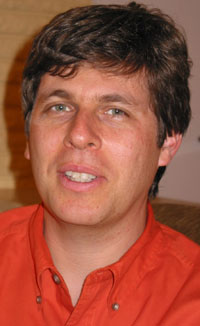Prof. Oren Etzioni from the University of Washington in Seattle, who, among other things, signed the website Meta-Crawler which allows searching in several search engines at the same time, talks about the search field on the Internet and how in the future computers will do the work for us
Avi Blizovsky,

Prof. Oren Etzioni, director of the Turing Institute at the University of Washington in Seattle
In about ten years, internet search will turn from a tool in which the surfer provides keywords and receives links to websites, to a tool in which he will ask free questions and receive accurate answers even to particularly complex questions. This is what Prof. Oren Etzioni, director of the Turing Institute at the University of Washington in Seattle, predicted, who lectured on the subject yesterday (Sunday) to graduates and students at the Efi Arazi School of Computer Science at the Herzliya Interdisciplinary Center.
Etzioni (42), born in Israel who immigrated with his parents to the USA at the age of 14 and began an academic career in his youth, was the founder of several start-ups whose technologies revolve around the field of data mining, including Farecast - which deals with locating cheap airline fares. He served as CTO of Go2net, which was acquired in 2000 by Infospace, and founded Netbot (which was acquired by Excite in 1997). In 1995, Etzioni and his student Eric Zilberg developed the Meta-Crawler website, an engine for searching multiple search engines at the same time, and another startup called ClearForest, which deals in the field of text mining.
Prof. Etzioni says that search has become a body of knowledge that reflects all of humanity. "The example of this is in Google's new products, such as Google Trends and Google Zeitgeist, which show what people are looking for. Zeitgeist (a term in German that has also been transferred to English and means the spirit of the times) is a tool that shows how many people searched for the requested keywords today. Whereas Google Trends tries to see the trends in searches over time. "For example, if you search on Google Trends for Olmert until 2005, he does not appear at all - no one searched for Olmert on Google and now there are a lot of searches, when the number of searches increased after he won the elections, mainly among surfers from the USA. Another trend that can be noticed is the search for queries on sensitive topics in countries where they are taboo, such as a large number of searches for keywords in the field of homosexuality from Muslim countries."
The research currently being carried out by a group of about ten researchers led by Etzioni at the Turing Institute is trying to build algorithms that will give artificial intelligence to the search engine. "Our research focuses on the ability to extract answers from pages, to move from the situation where you receive a query and read the page, to a situation where we turn the Internet from many pages that need to be read into a concentrated answer, the components of which can come from many pages that the computer 'reads' and understands. Our research deals with the computer's ability to 'read' the page more objectively and extract the facts from it. It's a research project that I've been working on for three years with a group of ten people - it's a basic research project that will continue for decades."
"For example," says Etzioni, "a computer can be taught to analyze what people think about a product, such as a certain laptop computer." The software will search for the pages where the computer is mentioned, but will continue and classify them according to reviews. On the review pages, she will decide if the writers say positive or negative things, go on and check what they say and return to the user with a summary along the lines of: 'I found 2,300 reviews, of which 80% were positive. The keyboard, battery and customer service were noted favorably. On the other hand, there are people who are not satisfied with the weight of the computer. It saves hours of reading all these documents yourself.”
Which technologies need to be improved?
"The technologies that still need to be improved are the technologies in the field of artificial intelligence; The classification is a classic example of learning under an object and placing it in one category or another. Reading is a technology that requires many abilities, such as the ability to draw conclusions. Much of what you want to understand from the text is not explicitly stated. If, for example, you see an article where it says that the person went to a restaurant, ate the food, really enjoyed it and left. Ask a computer today if he paid the bill, the computer will say 'I don't know - it's not written'. A person would understand that it can be assumed that he paid, because he was satisfied and they did not pursue him."
What about developments in the field of hardware?
"For a long time, the hardware is not what is stopping us. To perform the data mining we use a cluster of 40 computers. Moore's law runs much faster than the intelligence of computers. The intelligence of the computers is still in the stone age, while the computers themselves are in the 21st century. The most interesting problems of the future are not problems of hardware, but how to use the tremendous power that the talented hardware people have given us in the right way."
https://www.hayadan.org.il/BuildaGate4/general2/data_card.php?Cat=~~~497009427~~~64&SiteName=hayadan
